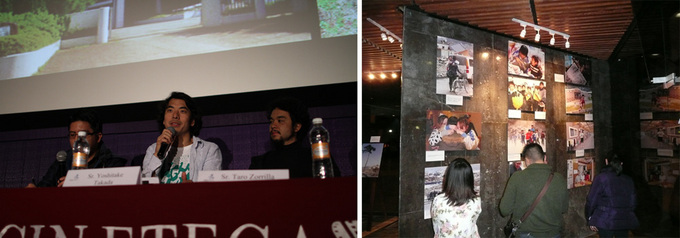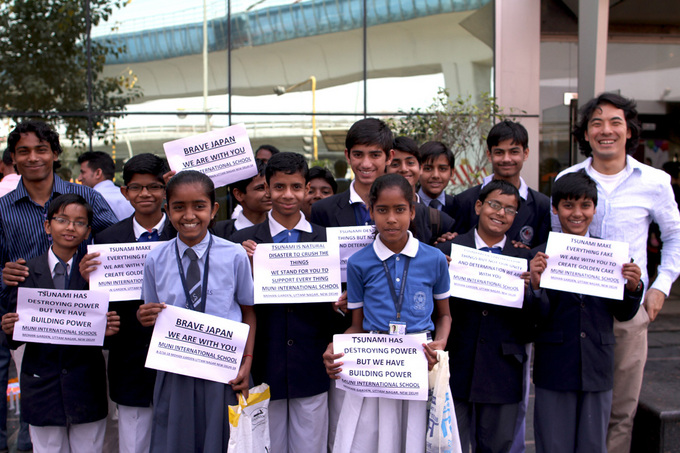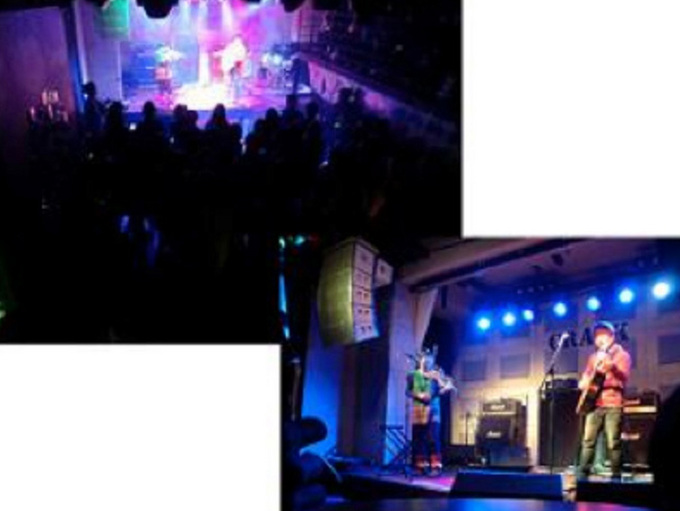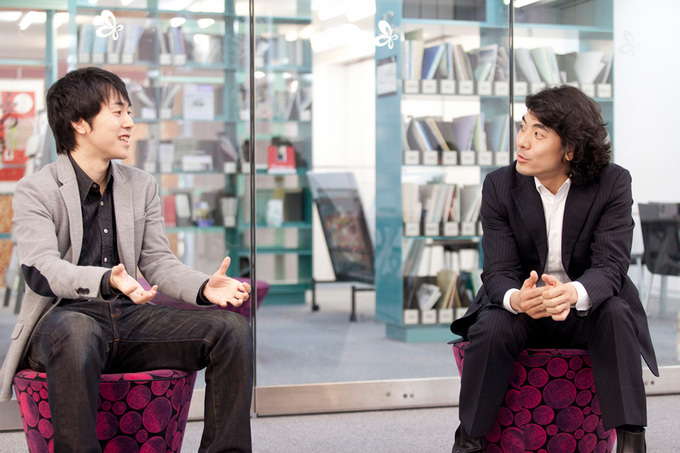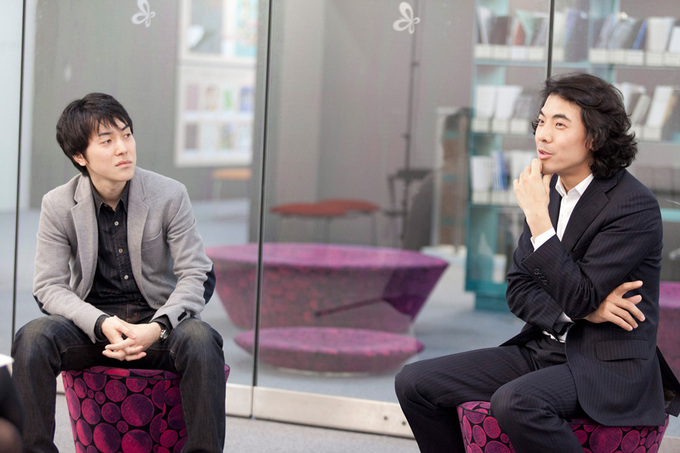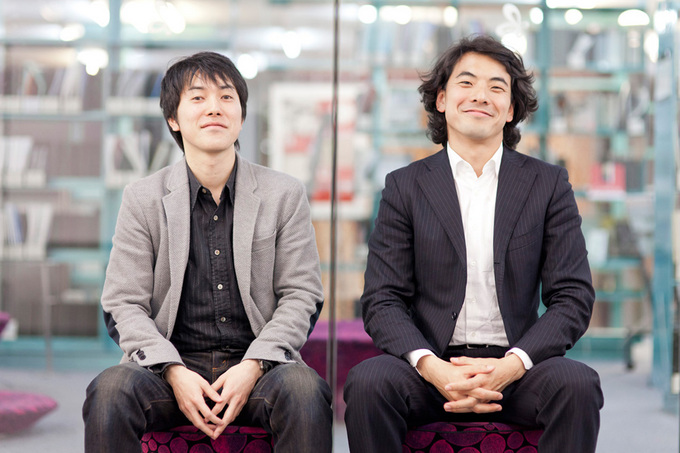Reviving Japan with Fireworks and Music: Interview with Two Young Leaders
Yoshitake Takada, Representative, Light Up Nippon
Takamasa Matsuura, Representative, NPO Blastbeat Japan
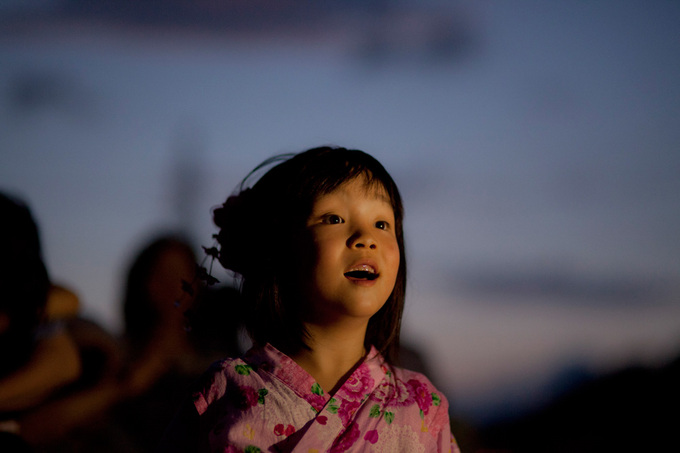 Light Up Nippon event in Otsuchi Town, Iwate, August 11, 2011
Light Up Nippon event in Otsuchi Town, Iwate, August 11, 2011
Five months on from the Great East Japan Earthquake, on August 11, 2011, an event called Light Up Nippon launched firework displays simultaneously in 10 disaster areas of the Tohoku region, to honor the souls of the victims and support the recovery of the survivors. The challenges leading up to the launch, and the reality of young Japanese people working to rebuild the devastated areas, was captured in a documentary film for sharing with overseas audiences. In March 2012, the film was screened 22 times in 14 countries including India. And on March 11, 2012, the first anniversary of the earthquake and tsunami, locals in India, Mexico, Malaysia, and South Korea organized their own memorial firework ceremonies. Yoshitake Takada, Representative of Light Up Nippon was sent to India, South Korea, and Mexico to hold a lecture and discussion, with local people along with the screening
http://www.jpf.go.jp/ij2012/event/2012_no06/index.html#memorial
The following article delivers an interview between Yoshitake Takada, founder of Light Up Nippon, which aims to brighten up and revitalize the Tohoku region by connecting people in Tokyo with people in the devastated areas, and Takamasa Matsuura, head of NPO Blastbeat Japan, which works to empower youths through music events. The two leaders seek an answer to the question: What can Japan do right now? Their approach offers a hint of the potential of young people, and of lifestyles and work styles befitting new times ahead.
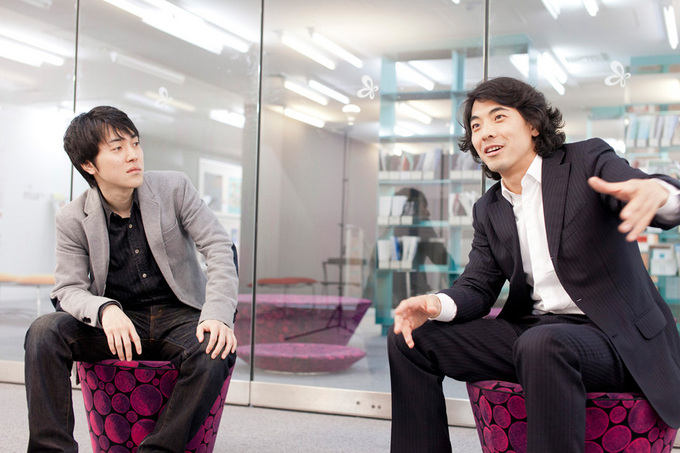 Takamasa Matsuura (left) and Yoshitake Takada (right)
Takamasa Matsuura (left) and Yoshitake Takada (right)
Reaction in India
----Mr. Takada, you gave a lecture about Light Up Nippon in New Delhi on March 11, 2012, one year after the Great East Japan Earthquake. How did the locals react to the project?
TAKADA: I was in for a surprise. The people of India have quite a different perception of fireworks for us in Japan. In India, fireworks are launched to celebrate auspicious events like festivals and weddings. So it was difficult to convey the very Japanese concept of praying for victims and recovery through firework displays. In the end, a specialist in Japanese language education from the Japan Foundation, New Delhi took over and explained the importance of fireworks to the Japanese people, and why it was such a big deal for us to have to cancel the traditional summer event because of the disaster. Only then did the audience understand.
MATSUURA: I wasn't aware of that Japanese tradition of mourning the deceased with fireworks either. I only gained a deeper understanding about the original meaning of fireworks after watching the Light Up Nippon film.
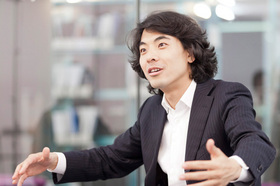 TAKADA: I may have read about it somewhere a long time ago, but it had slipped my mind until a pyrotechnist mentioned the origins of firework displays. From that moment on, that became my story. I went around the Tohoku region presenting my plans from that angle, and the people there understood right away the connection between fireworks and mourning the deceased. It must be a unique Japanese sensibility.
TAKADA: I may have read about it somewhere a long time ago, but it had slipped my mind until a pyrotechnist mentioned the origins of firework displays. From that moment on, that became my story. I went around the Tohoku region presenting my plans from that angle, and the people there understood right away the connection between fireworks and mourning the deceased. It must be a unique Japanese sensibility.
At the lecture in India, I enjoyed observing the expressions on the children's faces as they watched the film. Up to about midway, they were simply watching. But as the climax approached, and the countdown to the launch began, they got more and more excited. Their happiness really showed when the fireworks finally went up.
----How did the audience react after watching the fireworks go up?
TAKADA: I got a lot of questions about budget. How much it cost to launch the fireworks, how much time it took, how much we collected in donations...
----Well, India is the country of mathematics after all.
TAKADA: In their sense of the value of money, we had collected an enormous amount in donations. Some were surprised that we spent it on fireworks, when there must have been plenty of other uses for the money, like sending food or building houses.
----That's understandable. The damage from the earthquake and tsunami was broadcast all over the world.
TAKADA: But say we collected 100 million yen ($1.3 million). In Japan, we could build only about 10 houses. Do we make 10 families happy, or make 10,000 people happy for 30 minutes? I chose the latter.
----After India, you gave lectures in South Korea and Mexico. What was the reaction there?
TAKADA: The people of South Korea know, from their experience in wars with Japan, what it's like to have your culture taken away. So the audience there said it's wonderful that we preserved our culture. The country is also geographically close to Japan, so I felt a certain kinship with the younger people. The people of Mexico were very Latino. They loved that everyone in the film was smiling.
----Tell us about the firework ceremony the Japan Foundation, New Delhi organized with local elementary school students and youths on March 11.
TAKADA: The group was small, the ceremony grand.
Fireworks they used were number 3 shells, which in Japan require a license to purchase. But in India, anyone can buy them at the market. With the first batch the driver got, they launched 60 consecutive fireworks. I'd never seen anything so dynamic in Japan.
----Each participant said a prayer, lighting a candle on a map of Japan made of flower petals.
TAKADA: The kids are accustomed to fancy firework displays, so they thought it strange that we only launched one at a time.
 Ceremony with elementary school students in New Delhi
Ceremony with elementary school students in New Delhi
Driving force of activities
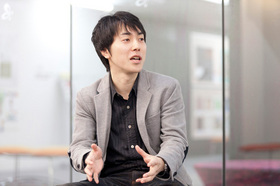 ----Mr. Matsuura, how did you come to start Blastbeat Japan?
----Mr. Matsuura, how did you come to start Blastbeat Japan?
MATSUURA: I played music in a band from 16 to 26 years old. At one point, I had my hair in a Mohawk and studs in my nose, chin, and lip. So I'd been planning music events since high school. My friends and I did everything ourselves, from researching venues, to planning our budget, to making posters and tickets and selling them to classmates.
----I see. So your own activities in music led to your serving as representative of Blastbeat as well as running your own marketing firm.
MATSUURA: Yes, my first experiences in music had built this unfounded confidence that I could accomplish anything if I put my mind to it.
I discovered Blastbeat after I had launched the marketing company. I happened to see a TV show featuring the activities of the Blastbeat program founded by an Irish music producer Robert Stephenson. My eyes were glued instantly. It was a completely ordinary documentary, saying some kids in the UK were doing interesting things. The program wasn't sad, but tears came rolling down my face. I may be exaggerating, but afterward, I thought this was a divine revelation, that I was meant to launch Blastbeat in Japan.
So I sent Robert an email. "I want to do Blastbeat in Japan. If you refuse, I will copy it exactly and launch the same program under a different name." A half-threat! But he replied immediately, saying he would be in Japan the following month so let's talk. After a few more exchanges, he approved. He said I was the man for Blastbeat Japan. That was the start.
TAKADA: Your motivation is amazing. You zoom in on one thing and just go with it.
MATSUURA: I'm that type. Once my sights are set, I don't stop.
----And you did all this while you had a day job in marketing?
MATSUURA: Yes, I ran the marketing company, and also went to Cambodia three or four times a year in support of the developing country. Cambodia's cultural foundation was destroyed by the Pol Pot regime. The scars of that era still remain today. So I went to orphanages and read books to the children. I tried to rebuild the custom of reading.
----Thank you. Then, Mr. Takada, how did you come to start Light Up Nippon?
TAKADA: My answer is simple: the Great East Japan Earthquake.
----Where were you at the time?
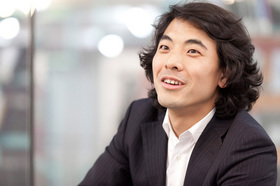 TAKADA: The Nihonbashi area of Tokyo. Waves of people were evacuating outdoors, and when the windows of the building I was in started to crack, I knew it was no ordinary tremor. The real shock, though, was seeing footages of the tsunami. I had studied fish and marine mammals at the Tokyo University of Fisheries. So I knew the tsunami was causing massive destruction. I had also lived in Otsuchi Town, in Iwate. So I was thinking about my friends there.
TAKADA: The Nihonbashi area of Tokyo. Waves of people were evacuating outdoors, and when the windows of the building I was in started to crack, I knew it was no ordinary tremor. The real shock, though, was seeing footages of the tsunami. I had studied fish and marine mammals at the Tokyo University of Fisheries. So I knew the tsunami was causing massive destruction. I had also lived in Otsuchi Town, in Iwate. So I was thinking about my friends there.
----Otsuchi was one of the towns most heavily damaged by the tsunami. When did you live there?
TAKADA: During graduate school, I spent about three months diving and going out for rides on the fishing boats. Some of the fishermen I knew died in the tsunami. Others survived. That made me think about what I should be doing at that moment.
Another thing I thought was Japan could change. This may not be the best choice of words, but the Japanese had lived comfortable, lukewarm lives up to then. With the tsunami, we faced the threat of death for the first time. An experience like that can change people a great deal. In fact, it was a chance for Japan to change. So I explored my options. I'm good at entertaining. OK then, I thought, why not do something to cheer people up, put a smile on their faces.
----And that something turned out to be the fireworks in Light Up Nippon.
TAKADA: That's right. I found out that the Tokyo Bay firework festival had been cancelled that summer. So I thought, great, I'll simply take all the leftover shells to the Tohoku region!
Initially, I imagined it would be an attractive deal. The fireworks were already there, and the pyrotechnists must be itching to launch them. So I talked to the maker, and his first words were, "Don't be silly, everything costs money." Yet I was sure my idea was feasible. Blind faith is important sometimes, isn't it? My idea became reality.
MATSUURA: During the project, did you communicate with the fishermen?
TAKADA: I did, yes. I knew Otsuchi, so I could talk to the locals on the same wavelength. If one says, "We're not catching any salmon," my response wouldn't end at, "Oh, that's too bad." I could take it a step further and say, "But they're in season. Why don't you go farther off shore?"
MATSUURA: Understanding and sympathizing with their problems is essential. I knew it. With any project, it's all about communication.
Range of choices for the disaster-afflicted people
----Since March 11, 2011, the concepts of parallel career (undertaking either two jobs or one job plus volunteering) and pro bono work (applying professional skills to volunteer projects) are attracting attention. You two are pioneers in these areas. What do you think of the current trend?
TAKADA: To be honest, I learned the term parallel career only a minute ago. How about you, Mr. Matsuura?
MATSUURA: I hear the term pro bono more often. Parallel career, I think, is more about having multiple jobs than about volunteering.
----In Japan, you're generally said to have parallel careers if you have a day job and engage in volunteer work after five. The term became popular after 3.11, when more people realized they want to do something they love.
MATSUURA: Since I launched Blastbeat Japan in 2009, everyone around me seemed to run parallel careers. So the concept isn't all that new to me. Although I agree it has spread further after 3.11.
TAKADA: I'm not a big fan of the term volunteer. Some people tell me I'm a model volunteer to set off fireworks in the disaster-hit Tohoku region. But I didn't volunteer to do anything.
I like seeing children smile. I only set off the fireworks because I'd rather see them smile than cry. If I wanted to help the disaster areas, a donation of even 100,000-200,000 yen ($1,250-$2,500) each month would be much more helpful.
So to me, both my job at the advertising agency and my activities in Light Up Nippon are a full-time career. Neither is more important than the other. I equally love them both.
MATSUURA: I agree. It's the same for me, too. I join any and all projects that spark my interest. I'm the representative of Blastbeat Japan, but before that, I'm an individual. I do what I do because I love doing it.
TAKADA: Exactly!
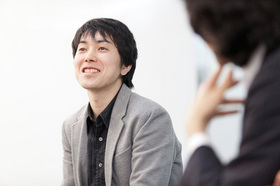 MATSUURA: In that sense, perhaps young people have more freedom to pursue their ideas. As you age and settle down, you have less material freedom to explore, what with a mortgage on your home, or a family to support.
MATSUURA: In that sense, perhaps young people have more freedom to pursue their ideas. As you age and settle down, you have less material freedom to explore, what with a mortgage on your home, or a family to support.
I can't speak across the board, but younger people tend to have a lighter responsibility. They have a wider range of choices. And more of them are acting on those choices. Not only in the context of volunteering, but for example even students can start up their own company or join a project.
----Why do you think more young people are doing that?
MATSUURA: They want to value their identity. The desire has always been there. But 3.11 helped to reveal role models in diverse work styles. It offered a wider range of choices.
TAKADA: In other words, the disasters raised awareness.
I was moved by a certain incident in the course of Light Up Nippon. It's in the film. A young man said he watched his house being swept away by the tsunami, and he felt his mundane life changing.
After that, he was on fire with passion. He started what he'd always want to do--music. He posted his performances on YouTube and everything. The videos are fun, but unfortunately, no one watched them. We chipped in by playing them over and over and increasing his number of views.
MATSUURA: That's a good story.
TAKADA: In the end, though, he returned to his old job. He had to, to make a living. I called him up the other day, and he was feeling blue that his life didn't change after all.
MATSUURA: That's such a shame, to let that fire die out.
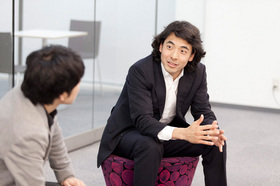 TAKADA: It's important to recover what was lost. But it's sad to give up a precious chance to change.
TAKADA: It's important to recover what was lost. But it's sad to give up a precious chance to change.
Never mind those of us in Tokyo. Nothing is broken. We have money. We have time. We have the choice of a parallel career. But it breaks my heart to see the people in the disaster areas, who felt the greatest opportunity to change, lose that opportunity. So I think it's fantastic that you, Mr. Matsuura, said you have plans for a Blastbeat project along the coast of Tohoku.
MATSUURA: I hate to see people give up. Everyone deserves to retain the hope that they might change the world, make a difference.
I want to spread Blastbeat in the Tohoku region not so much to offer jobs, but to help more people create jobs for themselves. Too many jobs in Japan are in the cities. There are plenty of people who want to stay in their hometown and work there. I want to give these people confidence that they can shape their own careers right where they are.
TAKADA: Good luck to us both. Many people are waiting to tap into their passion!
Goals for the future
----Finally, tell us what motivates you to go on.
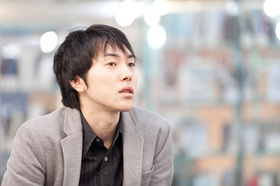 MATSUURA: I have no ups and downs in motivation. I simply do what I love doing, all the time. My next big goal is Blastbeat in the three disaster-hit prefectures of Tohoku--Miyagi, Iwate, and Fukushima. The locals launched the projects themselves, and this year, I want to help establish their projects, make them take root. I'll devote my energy to helping young people fulfill their wish of living in, creating jobs in, and rebuilding the town they love.
MATSUURA: I have no ups and downs in motivation. I simply do what I love doing, all the time. My next big goal is Blastbeat in the three disaster-hit prefectures of Tohoku--Miyagi, Iwate, and Fukushima. The locals launched the projects themselves, and this year, I want to help establish their projects, make them take root. I'll devote my energy to helping young people fulfill their wish of living in, creating jobs in, and rebuilding the town they love.
TAKADA: The same goes for me. The original goal of Light Up Nippon is to "light up Nippon." Fireworks alone can't do that. It's time to take the project to the next step.
My theme this year is the sea. I like the ocean, and fish, and anyone who works with them. So that will be the focus of my support. I've always had a dream to develop an educational program based on the sea. Offer classes for diving, catching fish, cleaning that fish... My role, of course, would be a school principal.
So in five or 10 years, I might not be involved in fireworks at all. Getting the project started was difficult. But once the framework is there, keeping it going is actually quite easy. I'd like to pass on the fireworks to the other staff members, and help revitalize Japan from a different angle.
Fireworks continue to go up. I return to the sea. That's my goal.
MATSUURA: The sea sounds great. I like fish, too. Can I join you?
TAKADA: Sure, let's do it together. We could change the "beat" in Blastbeat to some other word that relates to the sea.
MATSUURA: I'm not too sure about a Blastbeat collaboration, but I'd love to get involved personally. Let's do it!
photo by Kenichi Aikawa
The 28-minute documentary film Light Up Nippon (English version) is now available at the Japan Foundation website JF Video Square.
Light Up Nippon documentary film (28 min., with English narration and subtitles)
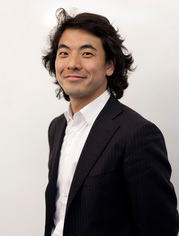 Yoshitake Takada
Yoshitake Takada
Representative, Light Up Nippon
http://lightupnippon.jp/en/
Born in 1977, Takada graduated the Tokyo University of Fisheries and the University of Tokyo's Ocean Research Institute, where he studied at the Otsuchi Marine Research Center. He obtained a scuba diving instructor's license and currently works at an advertising agency in Tokyo. Light Up Nippon, his project that launched firework displays simultaneously in 10 disaster areas of the Tohoku region to honor the souls of the victims, has raised more than 60 million yen ($760,000) in donations.
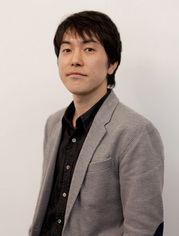 Takamasa Matsuura
Takamasa Matsuura
Representative, NPO Blastbeat Japan
http://blastbeat.jp
Born in 1978, Matsuura was the member of a band from 16 to 26 years old (during which he gained experience in more than 30 lines of work). He went on to study business administration for 14 months and launched a marketing firm. Engaging in NGO and international cooperation projects on the side, in 2009 he founded NPO Blastbeat Japan, a hands-on educational program that fosters young talent through music, entrepreneurship, and social contribution. In 2011, he organized the project Japan-Korea Blastbeat.
http://www.jpf.go.jp/j/culture/new/sinjidai/010.html
Japan-Korea Blastbeat video
http://www.jpf.go.jp/video/english/culture/index.html
Related Events
Back Issues
- 2025.6. 9 Creating a World Tog…
- 2024.10.25 My Life in Japan, Li…
- 2024.5.24 The 50th Japan Found…
- 2024.5.24 The 50th Japan Found…
- 2024.5. 2 People-to-People Exc…
- 2024.5. 2 People-to-People Exc…
- 2023.12. 7 Movie Theaters aroun…
- 2023.6.16 The 49th Japan Found…
- 2023.4.24 The 49th Japan Found…
- 2022.12.27 Living Together with…






